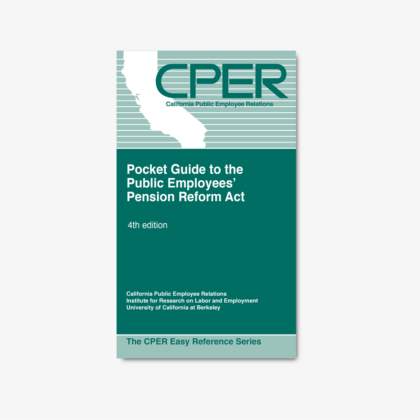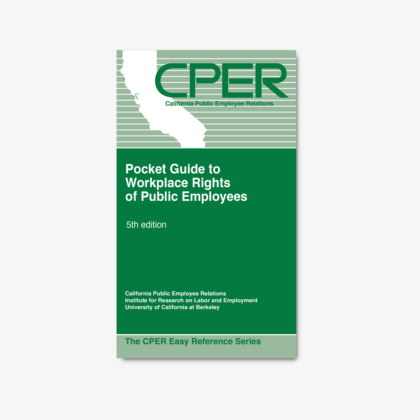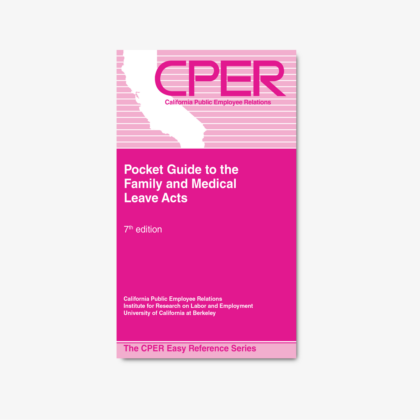CPER’s Pocket Guide to Public Sector Arbitration is the readable yet comprehensive guide to everything you need to know about public sector arbitration.
The fifth edition covers all new cases and statute changes in the four years since the book was last published. Revised content makes this Guide an even better aid for busy practitioners.
This guide:
- explains the procedures and principles that apply to both grievance arbitration and interest arbitration, including the standards that arbitrators use in deciding cases; and examines the courts’ treatment of final and binding arbitration.
- looks at arbitrators, themselves – their backgrounds, how they gain admission to rosters of arbitration agencies, constraints on their authority, and how parties make a selection.
- discusses the history and legal development of arbitration, from its private sector origins in the 1940s through its California public sector acceptance since the 1960s.
- includes for convenient reference the text of the California Arbitration Act, a list of the many court cases that are addressed in the text and in footnotes, and a bibliography of leading reference books.
About the Authors
Bonnie Bogue, coauthor of all editions of this guide, began arbitrating in 1977. A member of the National Academy of Arbitrators since 1991, she has served as vice president and on its board. She is a member of the College of Labor and Employment Lawyers. Formerly director of the CPER Program, she edited and contributed to CPER Journal from 1970 until 1994, and has coauthored other titles in CPER’s Pocket Guide Series, including Pocket Guide to Just Cause: Discipline and Discharge Arbitration.
Frank Silver, coauthor of the first three editions of this guide, has been an arbitrator, mediator and factfinder since 1987. Prior to that, he was in private practice as a labor lawyer, and served as an administrative law judge with the Public Employment Relations Board. He is a member of the National Academy of Arbitrators.
Katherine Thomson, coauthor of this fourth edition, has been arbitrating, mediating, and factfinding since 1997, and a member of the National Academy of Arbitrators since 2007. She was cochair of CPER from 2010-13, and editor of CPER Journal from 2011-13. Prior to her neutral career, she was an attorney in private practice. She is coauthor of Pocket Guide to Just Cause: Discipline and Discharge Arbitration.
Table of Contents
- What Is Arbitration? (Page 1)
- Origins of Labor Arbitration (Page 1)
- Who Are the Arbitrators? (Page 2)
- Origins of California Public Sector Arbitration (Page 4)
- Types of Arbitration and Other Dispute Resolution Methods (Page 6)
- Grievance arbitration vs. interest arbitration and factfinding (Page 6)
- Grievance or rights arbitration (Page 7)
- Interest arbitration (Page 7)
- Factfinding (Page 7)
- Binding vs. advisory grievance arbitration (Page 7)
- Arbitration vs. mediation (Page 8)
- Arbitration (Page 8)
- Mediation (Page 9)
- Med-arb (Page 9)
- Employment arbitration (Page 10)
- References (Page 10)
- Grievance Arbitration Procedures (Page 11)
- Types of Grievances (Page 11)
- Disciplinary grievances (Page 11)
- Contract interpretation grievances (Page 11)
- Group grievances (Page 12)
- Steps of the Grievance Procedure (Page 12)
- Processing the Grievance (Page 13)
- Filing the grievance (Page 13)
- Time limits (Page 13)
- Proceeding to arbitration (Page 14)
- Duty of fair representation (Page 14)
- Arbitrability: Procedural and Substantive (Page 15)
- Arbitrability determinations by arbitrators (Page 15)
- Procedural arbitrability issues (Page 16)
- Substantive arbitrability issues (Page 17)
- Costs of Arbitration (Page 18)
- Arbitration fees (Page 19)
- Selecting an Arbitrator (Page 19)
- Finding an arbitrator (Page 19)
- Researching an arbitrator (Page 20)
- Disclosures and ethical obligations (Page 21)
- Setting the Arbitration Hearing (Page 22)
- Pre-hearing contact with arbitrator (Page 22)
- Date and location (Page 23)
- Cancellations and postponements (Page 23)
- Pre-Hearing Procedures (Page 23)
- Pre-Hearing discovery (Page 23)
- Subpoenas (Page 25)
- Pre-hearing briefs (Page 25)
- Pre-hearing conference (Page 26)
- The Hearing (Page 26)
- Types of hearings (Page 27)
- Official record (Page 27)
- Order of the hearing (Page 27)
- Statement of the issue (Page 28)
- Retention of jurisdiction over remedy (Page 29)
- Opening statements (Page 30)
- Burden of proof (Page 30)
- Quantum of proof (Page 30)
- Documentary evidence (Page 31)
- Witnesses (Page 31)
- Grievant as a witness (Page 32)
- Expert witness (Page 33)
- Absent witnesses (Page 33)
- Preparing witnesses (Page 34)
- Taking the oath (Page 34)
- Sequestration of witnesses (Page 35)
- Witness testimony (Page 35)
- Direct examination (Page 36)
- Cross-examination (Page 37)
- Rules of Evidence (Page 38)
- Objections (Page 39)
- Improper or non-responsive answers (Page 39)
- Relevance (Page 40)
- Direct and circumstantial evidence (Page 40)
- Hearsay (Page 40)
- Non-hearsay statements (Page 42)
- Opinions (Page 43)
- Privileged communications (Page 43)
- Attorney-client privilege (Page 44)
- Mediator privilege (Page 44)
- Offers of settlement (Page 45)
- Objections to form of question (Page 45)
- Closing Arguments and Briefs (Page 48)
- Oral closing arguments (Page 48)
- Post-hearing briefs (Page 49)
- Filing briefs (Page 49)
- The Award (Page 50)
- Time limits (Page 50)
- Issuing the award (Page 50)
- Finality of the award (Page 51)
- References (Page 52)
- Types of Grievances (Page 11)
- Grievance Arbitration Standards (Page 53)
- Discipline and Discharge Standards (Page 53)
- Just cause (Page 53)
- Procedural principles of just cause (Page 54)
- Substantive principles of just cause (Page 61)
- Just cause and “external law” (Page 63)
- Remedies in Discipline Cases (Page 66)
- Make-whole remedy (Page 67)
- Back pay and benefits (Page 68)
- Other remedies (Page 69)
- Retaining jurisdiction over the remedy (Page 70)
- Contract Interpretation Grievances (Page 70)
- Rules of contract interpretation (Page 71)
- Remedies in Contract Interpretation Cases (Page 78)
- Monetary remedies (Page 78)
- Attorney’s fees (Page 79)
- Interest (Page 79)
- Equitable relief (Page 79)
- References (Page 79)
- Discipline and Discharge Standards (Page 53)
- PERB and Grievance Arbitration (Page 81)
- Deferral Principles (Page 81)
- Pre-Arbitration Deferral (Page 82)
- Post-Arbitration Deferral (Page 85)
- Equitable Tolling (Page 86)
- References (Page 87)
- Courts and Grievance Arbitration (Page 88)
- Introduction (Page 88)
- Petitions to Compel Arbitration (Page 89)
- General standards (Page 89)
- Grounds for compelling arbitration (Page 90)
- Waiver of the right to arbitrate (Page 92)
- Petitions to Confirm or Vacate Arbitration Awards (Page 93)
- General standards (Page 93)
- Arbitrator’s remedial authority (Page 97)
- Effect of Arbitration Provisions on Lawsuits (Page 99)
- Employer petitions to compel arbitration (Page 99)
- Preclusive effect of arbitration awards in litigation (Page 100)
- References (Page 101)
- Interest Arbitration and Factfinding (Page 102)
- Introduction (Page 102)
- Factfinding Procedures Administered by PERB (Page 103)
- Preliminary procedures under EERA and HEERA (Page 104)
- Preliminary procedures under MMBA and IHSSEERA (Page 105)
- Hearing procedures (Page 106)
- Post-hearing procedures (Page 106)
- Factfinder’s report (Page 107)
- Impasse Resolution in Public Transit (Page 107)
- Impasse Resolution in Charter Cities and Counties (Page 108)
- Interest Arbitration (Page 109)
- Standard interest arbitration (Page 110)
- Final-offer interest arbitration (Page 110)
- Med-arb (Page 111)
- Tripartite arbitration (Page 111)
- Factfinding and Interest Arbitration Criteria (Page 111)
- Employer’s ability to pay (Page 112)
- External salary and benefit comparisons (Page 113)
- Recruitment and retention (Page 114)
- Cost-of-living increases (Page 114)
- Past practice and negotiating history (Page 114)
- References (Page 115)
- Table of Cases (Page 116)
- Bibliography (Page 128)
- Appendix (Page 132)
- California Arbitration Act (Page 132)
- Index (Page 146)




